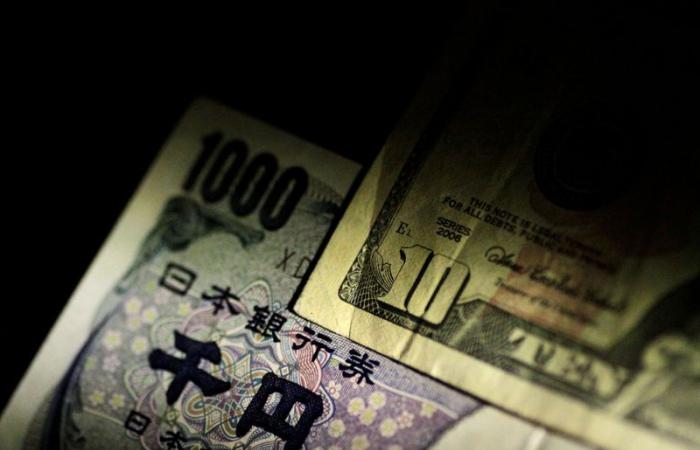The dollar remained stable on Monday, as traders waited for new clues on the development of US inflation which will likely influence interest rates, while speeches from Japanese authorities failed to temper the yen’s decline towards the round number of 160.
The yen weakened to 159.94 per dollar in early trade Monday, its lowest level since April 29, when the yen hit a 34-year low of 160.245, leading Japanese authorities to to spend some 9.8 trillion yen to support the currency.
It held steady at 159.70 per dollar after Masato Kanda, Japan’s top currency diplomat, said Monday that authorities would take appropriate action in the event of excessive currency movement, and that the addition of the Japan on the US Treasury’s currency watch list would not limit their action.
The yen came under further pressure after the Bank of Japan (BOJ) decided this month to wait until its July meeting to reduce its bond-buying program.
A summary of views expressed at the BOJ’s June meeting showed that some policymakers called for a timely interest rate increase as they saw a risk of inflation expectations being exceeded.
“It is quite remarkable that, despite expectations of further policy tightening from the BOJ, the dollar/yen continues to rise and is now back up to 160,” said Carol Kong, currency strategist at the Commonwealth Bank of Australia.
“I think that unless the BOJ gives very optimistic guidance on its policy, which is unlikely, it is unlikely that the dollar/yen will recover sustainably.
The dollar index, which measures the U.S. unit against six others, was at 105.84, close to the nearly eight-week high of 105.91 it hit last week.
This week, the spotlight will be on the Personal Consumption Expenditures (PCE) Price Index – the Federal Reserve’s preferred inflation gauge – which is due to be released on Friday.
Economists polled by Reuters expect the index’s annual growth to slow to 2.6% in May and a weak reading is likely to support bets on an interest rate cut as early as September, which Futures currently rate as a 65% prospect.
Evidence of a slowdown in the U.S. economy is mounting, Citi strategists said in a note to clients, adding that weaker demand makes a series of lower core inflation readings more likely. weak.
“The combination of slowing activity, softening labor markets and slowing inflation makes us increasingly confident that the Fed will begin cutting interest rates in September,” Citi said.
Throughout the week, there will also be a focus on geopolitics, with the first US presidential debate on Thursday and the first round of the French elections this weekend.
The euro, which has been under pressure since French President Emmanuel Macron called early elections earlier this month, was little changed at $1.0693. The single currency is down 1.4% this month.
France’s far-right National Rally (RN) party and its allies are leading the first round of French elections with 35.5% of the vote, according to a poll published on Sunday.
Christopher Wong, currency strategist at OCBC, said the spontaneous impact on the euro may vary, but is likely to be tilted to the downside unless the outcome surprises with the overall coalition winning. of President Macron.
In other currencies, the British pound remained stable at $1.2643. The Australian dollar held steady at $0.6640 and the New Zealand dollar was little changed at $0.6113.






